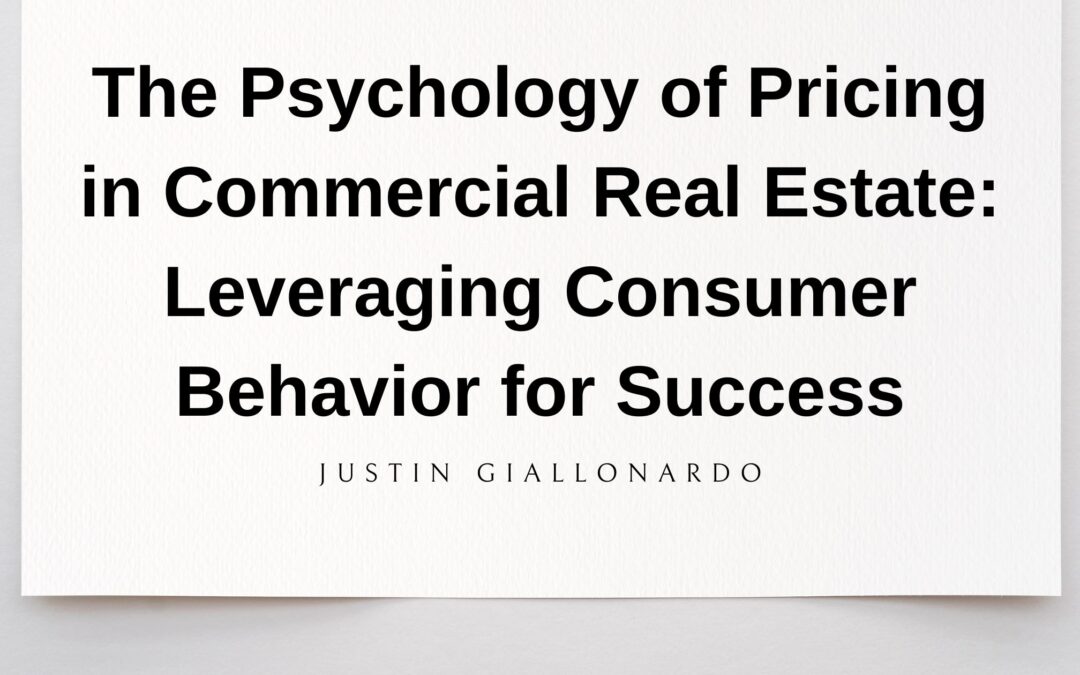In commercial real estate, pricing plays a pivotal role in attracting tenants, maximizing property value, and driving profitability. However, setting the right price goes beyond simple number-crunching—it involves understanding the psychology of pricing and how it influences tenant behavior and leasing decisions. In this blog post, we’ll explore the fascinating intersection of pricing psychology and commercial real estate, uncovering strategies that property owners and landlords can use to optimize their pricing strategies and achieve success in the market.
1. Anchoring and Perception: Anchoring is a powerful cognitive bias that influences how tenants perceive rental prices in commercial real estate. Property owners can strategically anchor rental rates by providing context, such as comparing rates to similar properties in the area or highlighting the unique features and amenities of their property. By framing prices effectively, property owners can shape tenants’ perceptions and position their property as a desirable and competitive option in the market.
2. Value-Based Pricing: Value-based pricing is about aligning the rental price with the perceived value of the property in the eyes of tenants. Property owners can leverage psychological pricing techniques, such as charm pricing (e.g., setting rents just below round numbers) or tiered pricing structures, to create an illusion of value and affordability. By emphasizing the benefits and advantages of leasing their property, owners can justify higher rents and attract tenants willing to pay for quality and convenience.
3. Scarcity and Urgency: Scarcity and urgency are potent psychological triggers that can drive tenant behavior in commercial real estate leasing. Property owners can create a sense of urgency by highlighting limited availability, expiring lease incentives, or upcoming market trends that may impact rental rates. By leveraging scarcity and urgency, owners can stimulate demand, accelerate leasing cycles, and maximize occupancy rates for their properties.

4. Negotiation Dynamics: Understanding the psychology of negotiation is crucial for property owners when discussing rental terms with prospective tenants. Owners can use anchoring techniques to establish a favorable starting point for negotiations and leverage reciprocity and social proof to build rapport and trust with tenants. By adopting a collaborative and empathetic approach to negotiations, owners can achieve win-win outcomes that satisfy both parties’ needs and objectives.
5. Personalization and Tenant Segmentation: Just as consumer price sensitivity varies, so too does tenant sensitivity to rental rates in commercial real estate. Property owners can leverage data analytics and segmentation to personalize pricing strategies based on tenant preferences, industry trends, and market dynamics. By tailoring rental rates to specific tenant segments and their unique requirements, owners can optimize revenue, minimize vacancy rates, and enhance the overall profitability of their properties.
Conclusion: In conclusion, the psychology of pricing plays a critical role in the success of commercial real estate ventures. By understanding the psychological factors that influence tenant behavior and leasing decisions, property owners can develop pricing strategies that maximize property value, attract desirable tenants, and drive long-term profitability. By anchoring rental rates effectively, emphasizing value propositions, leveraging scarcity and urgency, mastering negotiation dynamics, and personalizing pricing strategies, owners can gain a competitive edge in the commercial real estate market and achieve their investment objectives.

Based in Alexandria, Louisiana, Justin Giallonardo is a skilled commercial real estate and construction professional, a dedicated community member, and a loving family man.

